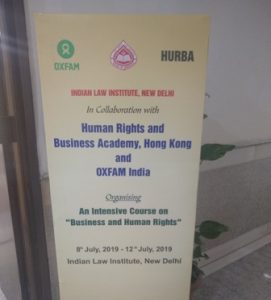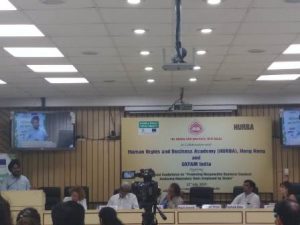Intersection of Business and Human Rights from Various Perspectives
The emerging Business and Human Rights strengthens the foundation of human rights which CSR alone failed to protect.

The evolution of Business and Human Rights (BHR) in the last couple of years has been inspiring. While a few developed countries have already framed a National Action Plan (NAP) on it, India is emerging as a leading developing country in implementing one besides encouraging other South Asian countries. Kenya and Thailand are the new countries to join the ‘draft-stage’ of NAP. With the help of UNGP guidelines, BHR and NAP are expanding in every part of the world, with India taking many initiatives in propagating it.
Recently, Indian Law Institute (ILI), Delhi, in collaboration with Human Rights and Business Academy (HURBA) and Oxfam India organized an intensive course on ‘Business and Human Rights’ from 8 July2019 to 12 July 2019. The course was facilitated by eminent people who authoritatively shared their insights and experiences in the 5 days’ session. The module of the course was curated to capture inter-connected disciplines and their relevance. Delhi Post brings you an unfiltered intel on knowledge sharing that was exchanged at this enriching collaboration.
Surya Deva, an associate professor at the School of Law, City University of Hong Kong and a member of the UN working group on BHR, helped in understanding business and human rights, their relationship, the why, what and how of BHR, and how Bhopal Gas Tragedy inspired him to work on this issue. He compared BHR with CSR (Corporate Social Responsibility) and RBC (Responsible Business Conduct) in attempting to throw light on the emergence of BHR in the last 20 years since CSR is failing.The example of garment industry of South Asia, especially in Bangladesh, where 80 per cent of the workers are women but managers are mainly men,is the accurate instance that shows the mass violation of human rights and gender discrimination in the name of business development.
Also Read : Business And Human Rights From Zero Draft To National Action
On being asked as why it keeps on continuing?
Surya Dev provided two main reasons, which are crucial and sums up the whole argument. First, the emergence of various powerful non-state actors like terrorist organizations, MNC’s and so on, which pose serious threats to human rights. They are of utmost threat because they are outsourcing our vital information to private sectors. Second, many states are either incapable or unwilling to regulate effective measures on the conduct of big corporations.

The need for implementation of 17 SDG’s and the three pillars of UNGP—‘protect-respect-remedy’—plays a critical role. In addition, the gender dimension of BHR brought a new perspective to the issue.
Namit Agarwal, a Lead Specialist in Private Sector Engagement at Oxfam India,dealt with the implementation part that includes issues of BHR, responsible supply chains and responsible finance. He talked about BHR issues with respect to the private sector and how it becomes difficult to educate the businesses about BHR because of the existence of CSR, which is nothing but merely corporate philanthropy. Instead of CSR, we need new business models, changing measures of progress, making issues such as living wages a non-competitive issue, etc. Various sources of information like SEBI, MCA filings, CHRB–Corporate Human Rights Benchmark, CHRB score weightage, India Responsible Business Index and organizations such as Oxfam India, Praxis and their activities were discussed in detail.
Manoj Kumar Sinha, who is currently working as Director of Indian Law Institute, provided information on BHR/CSR development in India by giving examples of Indian Companies Act, 2013, National Guidelines on Responsible Business Conduct and the relevance of public interest litigation.
Tara Van Ho, a lecturer and educational director on the post-graduate programmes in human rights at the University of Essex’s School of Law and Human Rights Centre (UK), provided us with a detailed analysis on UN Guiding Principles on Business and Human Rights.
On being asked about the nature of UNGP guidelines and India’s NAP on BHR, she said, ‘UNGP guidelines are helping countries to form their NAP on BHR like India but UNGP’s guidelines not being legally binding makes it bleak in nature.UNGP guidelines are still a soft law document and need the legal binding nature’. She focused on the three pillars of UNGP from a critical perspective in details. On India’s NAP, she said, ‘it is a great initiative taken up by the Government of India, which needs a national baseline assessment’.
Despite having UNGP guidelines, there is still no wonderful mechanism on women’s practice. State’s duty is to protect but regulation is not the only way to reach out to the target. States need to be accountable for their actions leading to human rights violations in the process of business development.
Lara Jesani, a lawyer and activist, talked about development, land acquisition, environmental pollution, and the role of civil society and human rights defenders. She informed that India has risen from 100th rank in 2017 to 77th rank in 2018 in ease of doing business but has fallen from 141st rank in 2016 to 180th rank in the global environmental performance index, that is, an indication about the so-called environmental governance in India.
Tuticorin (Toothukudi) Police Firing that took place on 22 May2018, killing 13 protestants and injuring many more, was discussed in detail.She told that there are incidents of cancer prevalent among people in the area. The medical authorities have labelled the district as ‘cancer district’, which shows the level of medical negligence and public health issues in the name of business development by the Sterlite Copper Plant of Vedanta situated there. She emphasized that people’s protest and the campaign is an important part of advocacy.
Justin Nolan, an associate professor and associate dean at University of New South Wales Law and a visiting scholar at New York University Stern Centre for Business and Human Rights, focused upon the OECD (Organisation for Economic Co-operation and Development) guidelines for multination enterprises and NCP (national contact points) complaint mechanism. NCP’s are not legally binding, however, awareness was provided upon—who, against whom one can file a complaint, what one can file as a complaint, when and why to file a complaint. A detailed analysis was covered about OECD guidelines and what are the current barriers to the remedy like poor organization structure, not enough resources, etc.
Around 80 per cent of the global trade flows through global supply chains linked to transnational corporations and 60 per cent of trade economy depends upon just 50 corporations. Modern slavery is exploiting the labourers for global supply chains since it doesn’t have any legal definition and incorporates the situation of exploitation. Instances such as forced labour, slavery and human trafficking fall under it.
Leila Choukroune, Professor of International Law and Director of the University of Portsmouth Thematic Area in Democratic Citizenship, talked about trade, investment and human rights. She focused upon the nexus between state-owned companies and human rights, and how international economic law regulates the entire process. India’s model of Bilateral Investment Treaty by GoI, MoF (department of economic affairs) and Morocco Nigeria Bilateral Treaty were discussed for a proper understanding.
Usha Ramanathan works on the jurisprudence of law, poverty and rights. She has been tracking and engaging with the Unique Identification Project (UID). She was a member of the Expert Group on Privacy set up in the committee (2013–14) under the Department of Biotechnology to review the Draft Human DNA Profiling Bill 2012. She gave a totally new dimension to BHR with reference to the nexus among technology, business and human rights by tracing back to Cambridge Analytica and coming to the recent data leak case of Facebook. In India, there is hardly any change among people as to how technology is violating our human rights of privacy because of the ‘way we receive information’.
Also Read : Time To Assert Land Rights As Human Rights
Projects like UID case/ADHAAR are infringing our right to privacy since there is no authorization under the UID project. Thus, she rightly said, ‘Data is the new Oil’.
The last session was delivered by Professor Surya Deva, where he narrated his insight on access to judicial remedies and barriers and proposed legally binding international instruments.
The course was followed up by the Conference on ‘Promoting Responsible Business Conduct: Analysing Regulatory Tools Employed by States’, in which panellists, Ranjit Singh (Joint Secretary, NHRC), Amitabh Behar (CEO, Oxfam India), Shankar Venkateswaran (Operating Partner and Head ESG, ECube Investment Advisors Pvt. Ltd), Friederike Tschampa (Head of Political Affairs, The delegation of the European Union to India and Bhutan), Viraf Mehta (Adjunct Faculty, Indian Institute of Corporate Affairs), and Leila Choukrone, discussed about the prevailing issues of human rights and corporate responses in line to the urgent need for BHR.
This intensive course on BHR not only presented an in-depth analysis of business and human rights but it also showed the importance of emerging BHR, how both local/global communities are working on it, the scenario of NAP, UNGP on BHR and what can be done in India and South Asia to promote it on a larger scale.
